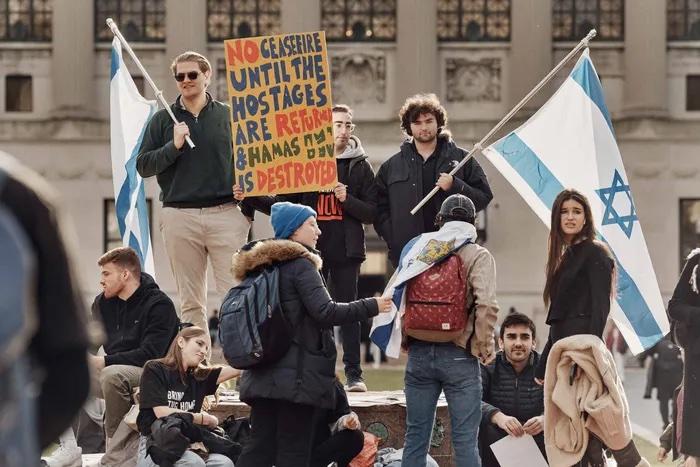Sighting: Columbia University, NYC - November 9, 2023
Zionist students counterprotest during a demonstration by SJP and SVP
Photo: Thomas Prior
___________________________________________________
EXCERPT
The Student Fight Trickles Up to Faculty
From the steps of the Low Library at Columbia, a group of faculty members and graduate students huddled together, banging pots against the wind. They were protesting the school’s suspension of Students for Justice in Palestine and Jewish Voice for Peace, two groups that held pro-Palestine demonstrations that the school claims were “unauthorized” and promoted “threatening rhetoric.” The faculty passed around a megaphone. “We are here to tell the students,” said Premilla Nadasen, a small, gray-haired history professor at Barnard, “they can suspend an organization, but they cannot suspend a movement.”
In the past few years, two factions of Columbia faculty have cemented their stances on Israel and Palestine, trading open letters for and against investing in companies in Israel and the building of a research center in Tel Aviv. Within each, a core group of around a hundred remain consistent, locked in an eternal bureaucratic feedback loop. But after October 7, students’ fervor has, in some ways, trickled up. It pushed “a lot of people into a corner they had not been in before,” says Bruce Robbins, a professor of comparative literature. Faculty members who had previously felt reluctant to express personal political views on campus now see no other option. After the backlash to a Students for Justice in Palestine letter professing “full solidarity with Palestinian resistance,” more than 170 faculty members signed a letter defending the students attempts to “recontextualize” the October 7 attack. More than 400 signed another one “horrified” at the first.
Tension had already been building among some faculty members. The day after the attack, Joseph Massad, an Arab-studies professor, published an article in the Palestinian outlet Electronic Intifada calling the attacks a “stunning victory of the Palestinian resistance over the Israeli military” and, in particular, stating that the sight of Hamas breaking through Israeli borders was “awesome.” One Israeli faculty member who describes himself as a “progressive liberal leftist” and agrees with a lot of what Massad has written, took issue with the article. He had signed an open letter objecting to the suspension of SJP and JVP but wanted to talk to Massad about the half-life of his words. “The word ‘awesome’ has been said over the last month in Columbia more times than it ever was,” he says. “I wanted to not confront him about his opinion, but I wanted to show him the results of his choice to not retract his words.” He consulted senior colleagues about how to address it directly with Massad, and they advised him not to. “They’re not silencing me because it’s not my field of research or anything like that,” he says. “It doesn’t harm any academic work. But they just think it won’t help if I, as an Israeli, go to him, as a Palestinian, and talk about that.” On most topics related to the Israel-Hamas war, the Israeli faculty member feels stuck. “With a lot of Israelis, I’m considered pro-Hamas just because I support human lives in Gaza,” he says. “And within my department, I’m the Israeli. So when we debate how to phrase open letters or internal letters, if I don’t speak up, no one will speak on the Israeli side.” I ask if that’s ever uncomfortable. “Yes,” he says. “But being uncomfortable is fine.”
Source:
https://nymag.com/intelligencer/article/israel-palestine-hamas-war-new-york-conflicts.html

